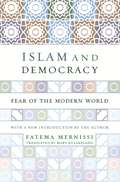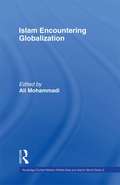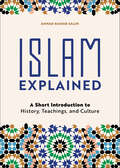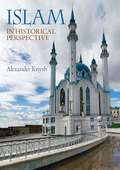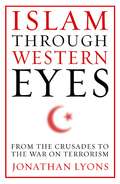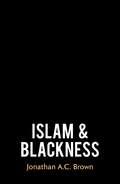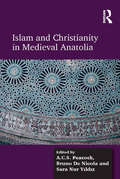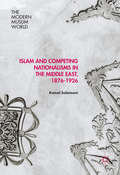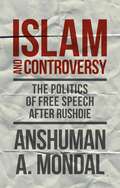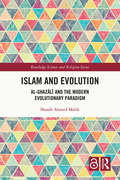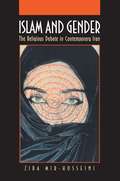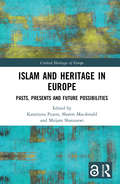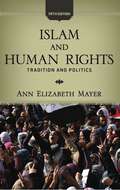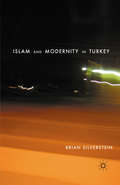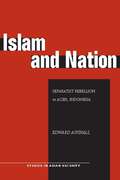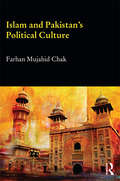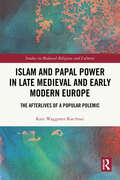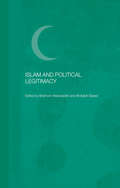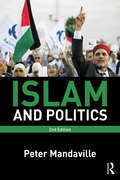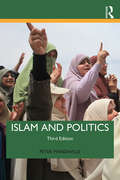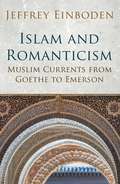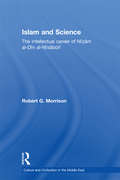- Table View
- List View
Islam And Democracy: Fear Of The Modern World With New Introduction
by Fatima MernissiIs Islam compatible with democracy? Must fundamentalism win out in the Middle East, or will democracy ever be possible? In this now-classic book, Islamic sociologist Fatima Mernissi explores the ways in which progressive Muslims--defenders of democracy, feminists, and others trying to resist fundamentalism--must use the same sacred texts as Muslims who use them for violent ends, to prove different views. Updated with a new introduction by the author written in the wake of the September 11 terrorist attacks on the United States, Islam and Democracy serves as a guide to the players moving the pieces on the rather grim Muslim chessboard. It shines new light on the people behind today's terrorist acts and raises provocative questions about the possibilities for democracy and human rights in the Islamic world. Essential reading for anyone interested in the politics of the Middle East today, Islam and Democracy is as timely now as it was upon its initial, celebrated publication.
Islam Encountering Globalisation (Durham Modern Middle East and Islamic World Series #Vol. 2)
by Ali MohammadiOne of the greatest dilemmas facing Muslims today is the fact that Muslim culture is often seemingly incompatible with the culture of the modern Western world, and the features associated with it - technological progress, consumerism, and new electronic communication, all of which have the potential for a homogenizing effect on any culture. This book explores many key aspects of the globalisation process, discussing how Muslim countries are coping with globalisation, as well as considering how the West is responding to Islam.
Islam Explained: A Short Introduction to History, Teachings, and Culture
by Ahmad Rashid SalimA revealing guide to understanding the principles of IslamWith more than 1.8 billion followers worldwide, Islam is one of the world's largest religions, but it is also one that is poorly understood by many Americans. Islam Explained offers an informative overview of the faith, helping those who are new to Islam foster cultural awareness while also providing those already familiar with it the opportunity to deepen their understanding.Whether you are looking to expand your own knowledge of Islam or just better understand the practices of Muslim friends, coworkers, and neighbors, this concise and essential guide provides a solid foundation for future study and conversation.Islam Explained features:Easy-to-understand explanations—This book provides a complete overview ideal for those who are interested in Islam as a faith, a subject of study, and beyond.Historical contexts—Better understand the history of Islam, how the religion has evolved, and the ways that history has shaped the lives of Muslims.Beliefs and practices—Explore what it means to be a practicing Muslim, including the Five Pillars, laws, dress codes, and brief glimpses into how they vary between individual sects.Take yourself on a journey that will end in a better, more complete understanding of Islam.
Islam In Historical Perspective
by Alexander Sasha KnyshThis introductory text on the history of Islam adopts a "civilizational" approach to the subject that "views Islam as a progressive unfolding in space and time of a certain set of foundational ideas that manifest themselves in all spheres of the lives of its followers--from their socio political actions to theological and philosophical thought, to artistic self-expression. " He presents 25 chapters broadly organized by chronology and theme. They address the historical development of the religion and the development of key sects, universal and particular beliefs and practices in the religion, key movements and schools of debate within the religion, institutions of knowledge transmission, the status of women, art and architecture, the Islamic encounter with European colonialism, and Islam as a political force, among other topics, from its beginnings to the present. Annotation ©2011 Book News, Inc. , Portland, OR (booknews. com)
Islam Through Western Eyes: From the Crusades to the War on Terrorism
by Jonathan LyonsDespite the West's growing involvement in Muslim societies, conflicts, and cultures, its inability to understand or analyze the Islamic world threatens any prospect for East–West rapprochement. Impelled by one thousand years of anti-Muslim ideas and images, the West has failed to engage in any meaningful or productive way with the world of Islam. Formulated in the medieval halls of the Roman Curia and courts of the European Crusaders and perfected in the newsrooms of Fox News and CNN, this anti-Islamic discourse determines what can and cannot be said about Muslims and their religion, trapping the West in a dangerous, dead-end politics that it cannot afford.In Islam Through Western Eyes, Jonathan Lyons unpacks Western habits of thinking and writing about Islam, conducting a careful analysis of the West's grand totalizing narrative across one thousand years of history. He observes the discourse's corrosive effects on the social sciences, including sociology, politics, philosophy, theology, international relations, security studies, and human rights scholarship. He follows its influence on research, speeches, political strategy, and government policy, preventing the West from responding effectively to its most significant twenty-first-century challenges: the rise of Islamic power, the emergence of religious violence, and the growing tension between established social values and multicultural rights among Muslim immigrant populations. Through the intellectual "archaeology" of Michel Foucault, Lyons reveals the workings of this discourse and its underlying impact on our social, intellectual, and political lives. He then addresses issues of deep concern to Western readers—Islam and modernity, Islam and violence, and Islam and women—and proposes new ways of thinking about the Western relationship to the Islamic world.
Islam and Asia: A History (New Approaches to Asian History)
by Chiara FormichiChiara Formichi explores the ways in which Islam and Asia have shaped each other's histories, societies and cultures from the seventh century to today. Challenging the assumed dominance of the Middle East in the development of Islam, Formichi argues for Asia's centrality in the development of global Islam as a religious, social and political reality. Readers learn how and why Asia is central to the history of Islam, and vice versa, considering the impact of Asia's Muslims on Islam; and how Islam became an integral part of Asia, and its influence on local conceptions of power, the sciences, arts, and bureaucracy. Grounding her argument in specific case studies, Formichi ultimately concludes that the existence of Islamized interactions across Asia have allowed for multi-directional influences on Islamic practices and interpretations throughout the Muslim world.
Islam and Blackness
by Jonathan A.C. BrownIt is commonly claimed that Islam is antiblack, even inherently bent on enslaving Black Africans. Western and African critics alike have contended that antiblack racism is in the faith&’s very scriptural foundations and its traditions of law, spirituality, and theology. But what is the basis for this accusation? Bestselling scholar Jonathan A.C. Brown examines Islamic scripture, law, Sufism, and history to comprehensively interrogate this claim and determine how and why it emerged. Locating its origins in conservative politics, modern Afrocentrism, and the old trope of Barbary enslavement, he explains how antiblackness arose in the Islamic world and became entangled with normative tradition. From the imagery of &‘blackened faces&’ in the Quran to Shariah assessments of Black women as &‘undesirable&’ and the assertion that Islam and Muslims are foreign to Africa, this work provides an in-depth study of the controversial knot that is Islam and Blackness, and identifies authoritative voices in Islam&’s past that are crucial for combatting antiblack racism today.
Islam and Christianity in Medieval Anatolia
by Bruno De Nicola A.C.S. PeacockIslam and Christianity in Medieval Anatolia offers a comparative approach to understanding the spread of Islam and Muslim culture in medieval Anatolia. It aims to reassess work in the field since the 1971 classic by Speros Vryonis, The Decline of Hellenism in Asia Minor and the Process of Islamization which treats the process of transformation from a Byzantinist perspective. Since then, research has offered insights into individual aspects of Christian-Muslim relations, but no overview has appeared. Moreover, very few scholars of Islamic studies have examined the problem, meaning evidence in Arabic, Persian and Turkish has been somewhat neglected at the expense of Christian sources, and too little attention has been given to material culture. The essays in this volume examine the interaction between Christianity and Islam in medieval Anatolia through three distinct angles, opening with a substantial introduction by the editors to explain both the research background and the historical problem, making the work accessible to scholars from other fields. The first group of essays examines the Christian experience of living under Muslim rule, comparing their experiences in several of the major Islamic states of Anatolia between the eleventh and fifteenth centuries, especially the Seljuks and the Ottomans. The second set of essays examines encounters between Christianity and Islam in art and intellectual life. They highlight the ways in which some traditions were shared across confessional divides, suggesting the existence of a common artistic and hence cultural vocabulary. The final section focusses on the process of Islamisation, above all as seen from the Arabic, Persian and Turkish textual evidence with special attention to the role of Sufism.
Islam and Competing Nationalisms in the Middle East, 1876-1926
by Kamal SoleimaniOpposing a binary perspective that consolidates ethnicity, religion, and nationalism into separate spheres, this book demonstrates that neither nationalism nor religion can be studied in isolation in the Middle East. Religious interpretation, like other systems of meaning-production, is affected by its historical and political contexts, and the processes of interpretation and religious translation bleed into the institutional discourses and processes of nation-building. This book calls into question the foundational epistemologies of the nation-state by centering on the pivotal and intimate role Islam played in the emergence of the nation-state, showing the entanglements and reciprocities of nationalism and religious thought as they played out in the late nineteenth and early twentieth century Middle East.
Islam and Controversy
by Anshuman A. MondalWas Salman Rushdie right to have written The Satanic Verses? Were the protestors right to have protested? What about the Danish cartoons? This important book examines the moral questions raised by cultural controversies, and how intercultural dialogue might be generated within multicultural societies.
Islam and Evolution: Al-Ghazālī and the Modern Evolutionary Paradigm (Routledge Science and Religion Series)
by Shoaib Ahmed MalikThis book attempts to equip the reader with a holistic and accessible account of Islam and evolution. It guides the reader through the different variables that have played a part in the ongoing dialogue between Muslim creationists and evolutionists. This work views the discussion through the lens of al-Ghazālī (1058-1111), a widely-known and well-respected Islamic intellectual from the medieval period. By understanding al-Ghazālī as an Ash’arite theologian, a particular strand of Sunni theology, his metaphysical and hermeneutic ideas are taken to explore if and how much Neo-Darwinian evolution can be accepted. It is shown that his ideas can be used to reach an alignment between Islam and Neo-Darwinian evolution. This book offers a detailed examination that seeks to offer clarity if not agreement in the midst of an intense intellectual conflict and polarity amongst Muslims. As such, it will be of great interest to scholars of Science and Religion, Theology, Philosophy of Religion, Islamic Studies, and Religious Studies more generally.
Islam and Gender: The Religious Debate in Contemporary Iran (Princeton Studies in Muslim Politics #7)
by Ziba Mir-HosseiniFollowing the Islamic Revolution of 1979 and the re-introduction of Sharica law relating to gender and the family, women's rights in Iran suffered a major setback. However, as the implementers of the law have faced the social realities of women's lives and aspirations, positive changes have gradually come about. Here Ziba Mir-Hosseini takes us to the heart of the growing debates concerning the ways in which justice for women should be achieved. Through a series of lively interviews with clerics in the Iranian religious center of Qom, she seeks to understand the varying notions of gender that inform Islamic jurisprudence and to explore how clerics today perpetuate and modify these notions.Mir-Hosseini finds three main approaches to the issue: insistence on "traditional" patriarchal interpretations based on "complementarity" but "inequality" between women and men; attempts to introduce "balance" into traditional interpretations; or a radical rethinking of the jurisprudential constructions of gender. She introduces the debates among the commentators by examining key passages in both written and oral texts and by narrating her meetings and discussions with the authors. Unique in its approach and its subject matter, the book relates Mir-Hosseini's engagement, as a Muslim woman and a social anthropologist educated and working in the West, with Shii'i Muslim thinkers of various backgrounds and views. In the literature on women in Islam, there is no account of such a face-to-face encounter, either between religion and gender politics or between the two genders.
Islam and Heritage in Europe: Pasts, Presents and Future Possibilities (Critical Heritages of Europe)
by Sharon Macdonald Katarzyna Puzon Mirjam ShatanawiIslam and Heritage in Europe provides a critical investigation of the role of Islam in Europe’s heritage. Focusing on Islam, heritage and Europe, it seeks to productively trouble all of these terms and throw new light on the relationships between them in various urban, national and transnational contexts. Bringing together international scholars from a range of disciplines, this collection examines heritage-making and Islam in the context of current events in Europe, as well as analysing past developments and future possibilities. Presenting work based on ethnographic, historical and archival research, chapters are concerned with questions of diversity, mobility, decolonisation, translocality, restitution and belonging. By looking at diverse trajectories of people and things, this volume encompasses multiple perspectives on the relationship between Islam and heritage in Europe, including the ways in which it has played out and transformed against the backdrop of the ‘refugee crisis’ and other recent developments, such as debates on decolonising museums or the resurgence of nationalist sentiments. Islam and Heritage in Europe discusses specific articulations of belonging and non-belonging, and the ways in which they create new avenues for re-thinking Islam and heritage in Europe. This ensures that the book will be of interest to academics, researchers and postgraduate students engaged in the study of heritage, museums, Islam, Europe, anthropology, archaeology and art history.
Islam and Human Rights
by Ann Elizabeth MayerIslam and Human Rightsis a probing examination of how the Islamic tradition has been exploited for political ends by regimes and institutions seeking to legitimize policies inimical to human rights. Ann Elizabeth Mayer critically appraises Islamic human rights schemes that dilute the human rights afforded by international law, comparing them with the complex Islamic legal heritage and international human rights law. Challenging stereotypes about a supposedly monolithic Islam inherently incompatible with human rights, Mayer dissects the political motives behind the selective deployment of elements of the Islamic tradition by conservative forces seeking to delegitimize demands for democracy and human rights. The fifth edition provides an updated consideration of government policies on Islam and human rights activism and how they are affecting developments in several Middle Eastern countries, and features a new chapter on the resistance of human rights for sexual minoritiesby the Organization of Islamic Cooperation (OIC) and Muslim states. The new edition also analyzes the other most recent and important issues of the region, including: The burgeoning pressures in the Middle East for human rights leading up to the Arab Spring; The ambitious campaign of the (OIC) to influence the UN human rights system by forging alliances with non-Muslim states hostile to human rights; The concerted efforts by this cross-cultural alliance to subvert international human rights law under pretenses of supporting human rights; The intensifying controversies over issues of sexual orientation and gender identity in the Middle East; The Danish Cartoons controversy and the OIC project to co-opt international human rights law to criminalize “defamation of Islam” occurring in the West.
Islam and Human Rights
by Ann Elizabeth MayerIslam and Human Rights is a probing examination of how the Islamic tradition has been exploited for political ends by regimes and institutions seeking to legitimize policies inimical to human rights. Ann Elizabeth Mayer critically appraises Islamic human rights schemes that dilute the human rights afforded by international law, comparing them with the complex Islamic legal heritage and international human rights law. Challenging stereotypes about a supposedly monolithic Islam inherently incompatible with human rights, Mayer dissects the political motives behind the selective deployment of elements of the Islamic tradition by conservative forces seeking to delegitimize demands for democracy and human rights. The fifth edition provides an updated consideration of government policies on Islam and human rights activism and how they are affecting developments in several Middle Eastern countries, and features a new chapter on the resistance of human rights for sexual minoritiesby the Organization of Islamic Cooperation (OIC) and Muslim states. The new edition also analyzes the other most recent and important issues of the region, including: The burgeoning pressures in the Middle East for human rights leading up to the Arab Spring; The ambitious campaign of the (OIC) to influence the UN human rights system by forging alliances with non-Muslim states hostile to human rights; The concerted efforts by this cross-cultural alliance to subvert international human rights law under pretenses of supporting human rights; The intensifying controversies over issues of sexual orientation and gender identity in the Middle East; The Danish Cartoons controversy and the OIC project to co-opt international human rights law to criminalize "defamation of Islam" occurring in the West.
Islam and Modernity in Turkey
by Brian SilversteinThis book combines fine-grained ethnography with conceptual and analytical work to examine Islamic discourses and practices and their articulation within mass media.
Islam and Nation: Separatist Rebellion in Aceh, Indonesia
by Edward AspinallBetween 1976 and 2005 the Free Aceh Movement (Gerakan Aceh Merdeka, or GAM) waged a protracted secessionist struggle against the Indonesian state in the name of Acehnese nationalism. In this study, Espinall (political science and social change, Australian National U. , Australia) conducts an analysis of the origins and development of Acehnese nationalism. He stresses the role of agency, particularly the actions and views of the founder of GAM, Hasan di Tiro; later Acehnese nationalists who came to challenge some of his views; and political actors from Aceh's Indonesian political establishment. He also stresses three central aspects of context: the institutional context of state formation; the international context that shaped the discourse of Acehnese actors, including Acehnese experiences of exile and international law discourses of self-determination; and factors of social context such as kinship networks, ideas about masculinity, and socioeconomic structures. A further major theme is the relationship between Islam and nationalism. Annotation ©2009 Book News, Inc. , Portland, OR (booknews. com)
Islam and Nazi Germany's War
by David MotadelWith troops fighting in regions populated by Muslims from the Sahara to the Caucasus, Nazi officials saw Islam as a powerful force with the same enemies as Germany: the British Empire, the Soviet Union, and the Jews. David Motadel provides the first comprehensive account of Berlin's ambitious attempts to build an alliance with the Islamic world.
Islam and Pakistan's Political Culture (Durham Modern Middle East and Islamic World Series)
by Farhan Mujahid ChakThis book explores the ideological rivalry which is fuelling political instability in Muslim polities, discussing this in relation to Pakistan. It argues that the principal dilemma for Muslim polities is how to reconcile modernity and tradition. It discusses existing scholarship on the subject, outlines how Muslim political thought and political culture have developed over time, and then relates all this to Pakistan’s political evolution, present political culture, and growing instability. The book concludes that traditionalist and secularist approaches to reconciling modernity and tradition have not succeeded, and have in fact led to instability, and that a revivalist approach is more likely to be successful.
Islam and Papal Power in Late Medieval and Early Modern Europe: The Afterlives of a Popular Polemic (Studies in Medieval Religions and Cultures)
by Kate Waggoner KarchnerIslam and Papal Power in Late Medieval and Early Modern Europe traces the influential history of another book: Riccoldo da Montecroce’s Contra legem Sarracenorum. Around 1301, a Dominican missionary named Riccoldo da Montecroce wrote a treatise on the Qur’an, arguing against the validity of the Muslim faith. Over the next two hundred years, Europeans read, copied, translated, and circulated Riccoldo’s work more than any other text on Islam. This study overviews and contextualizes that popularity in order to analyze Christian understandings of Islam in early modern Europe.Analysing the thirty-four surviving manuscript copies, this book studies the way the text was transcribed, the notes that readers made in the margins, and the contexts in which it was copied. Critically, this book also puts the transmission analysis into the broader context of major European historical developments. This context reveals that Contra legem became a tool for Europeans who linked fear of the Ottoman Empire to instability within the Church. Specifically, readers used Riccoldo’s descriptions of the dangers of the Qur’an to conflate the Ottoman Empire with a broader Islamic threat to Christian society. Such positioning helped readers to substantiate the divine authority of the western Church – and especially the papacy – as a bulwark against this threat.This book will be of interest to scholars working on interreligious dialogue and Christian-Muslim relations in medieval and early modern Europe and the Mediterranean. It will appeal to historians of religion, scholars of late medieval and early modern thought, and students of pre- and early modern history at the upper undergraduate and graduate levels.
Islam and Political Legitimacy
by Shahram Akbarzadeh Abdullah SaeedAkbarzadeh and Saeed explore one of the most challenging issues facing the Muslim world: the Islamisation of political power. They present a comparative analysis of Muslim societies in West, South, Central and South East Asia and highlight the immediacy of the challenge for the political leadership in those societies. Islam and Political Legitimacy contends that the growing reliance on Islamic symbolism across the Muslim world, even in states that have had a strained relationship with Islam, has contributed to the evolution of Islam as a social and cultural factor to an entrenched political force. The geographic breadth of this book offers readers a nuanced appraisal of political Islam that transcends parochial eccentricities. Contributors to this volume examine the evolving relationship between Islam and political power in Bangladesh, Indonesia, Iran, Malaysia, Pakistan, Saudi Arabia and Uzbekistan.Researchers and students of political Islam and radicalism in the Muslim world will find Islam and Political Legitimacy of special interest. This is a welcome addition to the rich literature on the politics of the contemporary Muslim world.
Islam and Politics
by Peter MandavilleThis book is an accessible and comprehensive account of political Islam in the twenty-first century. Drawing on insights from comparative politics and Islamic studies, it explains the complex interaction between Islam, society, the state, and processes of globalization. The book demonstrates that political Islam, far from being a monolithic phenomenon, varies considerably from country to country depending on its position in relation to society, the state, and the broader political environment. The book provides a portrait of Islam and politics through a combination of detailed case studies and country overviews that span the globe from the Middle East to Central and South Asia, Southeast Asia and Europe and North America--as well as a detailed account of the global jihadist movement. Engaging the debate on "post-Islamism" and the aftermath of Arab Uprisings, the book also provides a roadmap of possible futures for Islam and politics. Subjects covered include: * history of Islam and politics and an overview of key concepts * how political Islam interacts with the nation-state and the global economy * a wide variety of global case studies * profiles of key movements and individuals Fully illustrated throughout, featuring maps, a glossary and suggestions for further reading, this is the ideal introduction to the crucial role of political Islam in the contemporary world.
Islam and Politics (3rd edition)
by Peter MandavilleThis book is an accessible and comprehensive account of political Islam in the contemporary world. Providing a broad introduction to all major aspects of the interface of Islam and politics it combines an accessible style with sufficient depth for the academic classroom. Drawing on insights from comparative politics and Islamic studies, this book explains the complex interaction between Islam, society, the state, and processes of globalization. Preserving the previous editions’ strong focus on key concepts from Islamic history as they relate to contemporary political Islam, this new edition includes coverage of important developments and updated country overviews from the Middle East, Central and South Asia, Southeast Asia, Europe and North America. Features include: Two new case studies on Southeast Asia and Europe. Exploration of the origins and development of ISIS, Al-Qaeda and various regional affiliates of the global Salafi-Jihadi movement. Coverage of contemporary debates about radicalization and violent extremism. Examination of questions of Islam’s compatibility with democracy; the role of women; and Islamic perspectives on violence and conflict. Discussion of major theoretical debates in the literature on political Islam, the debate on Islamic exceptionalism and whether Islamist politics can be understood using the conventional tools of comparative political science and International Relations. These updates ensure the book remains the single best introduction to the topic of political Islam for students and scholars, foreign policy professionals and the general reader.
Islam and Romanticism: Muslim Currents from Goethe to Emerson (Islamic and Muslim Contributions to Cult)
by Jeffrey EinbodenRevealing Islam's formative influence on literary Romanticism, Islam and Romanticism traces a lively lineage of interreligious exchange, surveying the impact of Muslim sources on the West's most seminal authors. Spanning continents and centuries, the book surveys Islamic receptions that bridge Romantic periods and personalities, unfolding from Europe to Britain and America, and embracing figures from Goethe to Byron and Emerson. Broad in historical scope, Islam and Romanticism is also specific in personal detail-exposing Islam's role as a creative catalyst-but also as a spiritual resource, with the Qur'an and Sufi poetry infusing Western literary publications.Highlighting cultural encounter, rather than political exploitation, the book differs from previous treatments by accenting Western receptions that transcend mere Orientalism, finding the genesis of a global literary culture first emerging in the Romantics' early appeal to Islamic traditions.
Islam and Science: The Intellectual Career of Nizam al-Din al-Nisaburi (Culture and Civilization in the Middle East)
by Robert MorrisonIn examining the work of eminent fourteenth century Iranian Shiite scholar Nizam al-Din al-Nisaburi, this book is the first rigorous attempt to explain the cross-fertilization of scientific and religious thought in Islamic civilization. Nisaburi did not consider himself a scientist alone, being commissioned by his patrons to work in a variety of fields. Islam and Science examines in detail the relationship between the metaphysics of Nisaburi's science, and statements he made in his Qur'an commentary and in other non-scientific writings. Sources suggest that Nisaburi was inspired to begin his scientific career by the inclusion of basic science in a religious (madrasa) education. By mid-career, he had found methodological similarities between theoretical astronomy and Islamic jurisprudence. Morrison concludes that while Nisaburi believed science could give one a taste of God's knowledge, he realised that the study of science and natural philosophy alone could not lead him to a spiritual union with God. Only Sufi practice and Sufi theory could accomplish that. Morrison's work is remarkable in synthesizing the history of Islamic science with other areas of Islamic studies. It will be of interest to students and scholars of religion and the history of science, as well as readers with a more general interest in Middle Eastern studies. Winner of the Iranian World Prize for Book of the Year in Islamics Studies 2009
